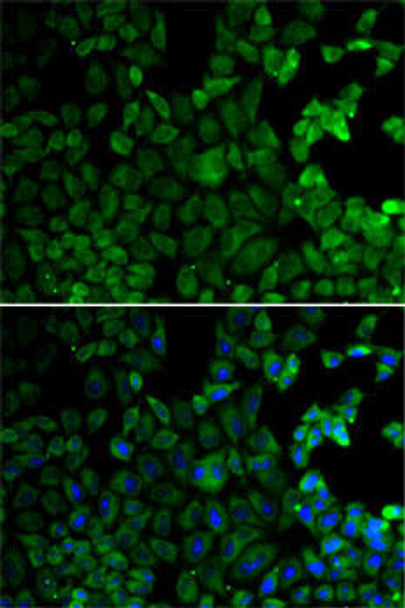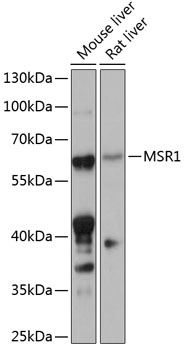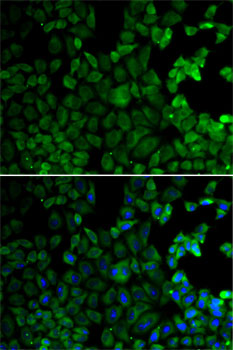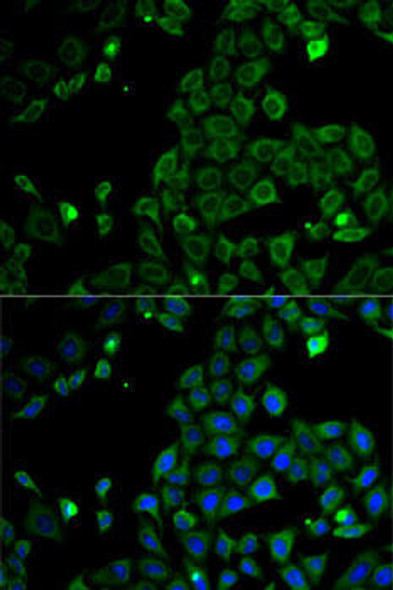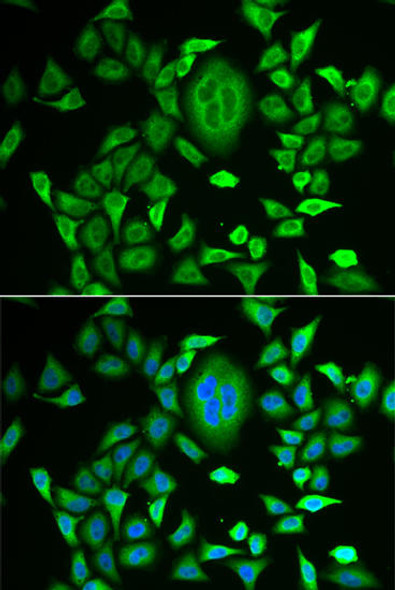Anti-MSR1 Antibody (CAB14187)
제품 코드를 사용하여 Assay Genie 메인 사이트를 통해 주문합니다.
주문- SKU:
- CAB14187
- Product type:
- Antibody
- Reactivity:
- Human
- Reactivity:
- Mouse
- Reactivity:
- Rat
- Host Species:
- Rabbit
- Isotype:
- IgG
- Antibody Type:
- Polyclonal Antibody
- Research Area:
- Cell Biology
Frequently bought together:
Description
| Antibody Name: | Anti-MSR1 Antibody |
| Antibody SKU: | CAB14187 |
| Antibody Size: | 20uL, 50uL, 100uL |
| Application: | WB IF |
| Reactivity: | Human, Mouse, Rat |
| Host Species: | Rabbit |
| Immunogen: | Recombinant fusion protein containing a sequence corresponding to amino acids 192-451 of human MSR1 (NP_619729.1). |
| Application: | WB IF |
| Recommended Dilution: | WB 1:500 - 1:2000 IF 1:50 - 1:200 |
| Reactivity: | Human, Mouse, Rat |
| Positive Samples: | Mouse liver, Rat liver |
| Immunogen: | Recombinant fusion protein containing a sequence corresponding to amino acids 192-451 of human MSR1 (NP_619729.1). |
| Purification Method: | Affinity purification |
| Storage Buffer: | Store at -20°C. Avoid freeze / thaw cycles. Buffer: PBS with 0.02% sodium azide, 50% glycerol, pH7.3. |
| Isotype: | IgG |
| Sequence: | LNIE NLNG KIQE NTFK QQEE ISKL EERV YNVS AEIM AMKE EQVH LEQE IKGE VKVL NNIT NDLR LKDW EHSQ TLRN ITLI QGPP GPPG EKGD RGPT GESG PRGF PGPI GPPG LKGD RGAI GFPG SRGL PGYA GRPG NSGP KGQK GEKG SGNT LTPF TKVR LVGG SGPH EGRV EILH SGQW GTIC DDRW EVRV GQVV CRSL GYPG VQAV HKAA HFGQ GTGP IWLN EVFC FGRE SSIE ECKI RQWG TRAC SHSE DAGV TCTL |
| Gene ID: | 4481 |
| Uniprot: | P21757 |
| Cellular Location: | Membrane, Single-pass type II membrane protein |
| Calculated MW: | 39kDa/42kDa/49kDa |
| Observed MW: | 60kDa |
| Synonyms: | MSR1, CD204, SCARA1, SR-A, SR-AI, SR-AII, SR-AIII, SRA, phSR1, phSR2 |
| Background: | This gene encodes the class A macrophage scavenger receptors, which include three different types (1, 2, 3) generated by alternative splicing of this gene. These receptors or isoforms are macrophage-specific trimeric integral membrane glycoproteins and have been implicated in many macrophage-associated physiological and pathological processes including atherosclerosis, Alzheimer's disease, and host defense. The isoforms type 1 and type 2 are functional receptors and are able to mediate the endocytosis of modified low density lipoproteins (LDLs). The isoform type 3 does not internalize modified LDL (acetyl-LDL) despite having the domain shown to mediate this function in the types 1 and 2 isoforms. It has an altered intracellular processing and is trapped within the endoplasmic reticulum, making it unable to perform endocytosis. The isoform type 3 can inhibit the function of isoforms type 1 and type 2 when co-expressed, indicating a dominant negative effect and suggesting a mechanism for regulation of scavenger receptor activity in macrophages. |
| UniProt Protein Function: | MSR1: Membrane glycoproteins implicated in the pathologic deposition of cholesterol in arterial walls during atherogenesis. Two types of receptor subunits exist. These receptors mediate the endocytosis of a diverse group of macromolecules, including modified low density lipoproteins (LDL). Isoform III does not internalize actetylated LDL. Defects in MSR1 may be a cause of prostate cancer (PC). A malignancy originating in tissues of the prostate. Most prostate cancers are adenocarcinomas that develop in the acini of the prostatic ducts. Other rare histopathologic types of prostate cancer that occur in approximately 5% of patients include small cell carcinoma, mucinous carcinoma, prostatic ductal carcinoma, transitional cell carcinoma, squamous cell carcinoma, basal cell carcinoma, adenoid cystic carcinoma (basaloid), signet- ring cell carcinoma and neuroendocrine carcinoma. MSR1 variants may play a role in susceptibility to prostate cancer. MSR1 variants have been found in individuals with prostate cancer and co-segregate with the disease in some families. Defects in MSR1 may be a cause of Barrett esophagus (BE). A condition characterized by a metaplastic change in which normal esophageal squamous epithelium is replaced by a columnar and intestinal-type epithelium. Patients with Barrett esophagus have an increased risk of esophageal adenocarcinoma. The main cause of Barrett esophagus is gastroesophageal reflux. The retrograde movement of acid and bile salts from the stomach into the esophagus causes prolonged injury to the esophageal epithelium and induces chronic esophagitis, which in turn is believed to trigger the pathologic changes. Genetic variants in MSR1 have been found in individuals with Barrett esophagus and are thought to contribute to disease susceptibility. 3 isoforms of the human protein are produced by alternative splicing. |
| UniProt Protein Details: | Protein type:Membrane protein, integral Chromosomal Location of Human Ortholog: 8p22 Cellular Component: integral to plasma membrane; plasma membrane Molecular Function:low-density lipoprotein binding; protein binding Biological Process: cholesterol transport; receptor-mediated endocytosis Disease: Barrett Esophagus; Prostate Cancer |
| NCBI Summary: | This gene encodes the class A macrophage scavenger receptors, which include three different types (1, 2, 3) generated by alternative splicing of this gene. These receptors or isoforms are macrophage-specific trimeric integral membrane glycoproteins and have been implicated in many macrophage-associated physiological and pathological processes including atherosclerosis, Alzheimer's disease, and host defense. The isoforms type 1 and type 2 are functional receptors and are able to mediate the endocytosis of modified low density lipoproteins (LDLs). The isoform type 3 does not internalize modified LDL (acetyl-LDL) despite having the domain shown to mediate this function in the types 1 and 2 isoforms. It has an altered intracellular processing and is trapped within the endoplasmic reticulum, making it unable to perform endocytosis. The isoform type 3 can inhibit the function of isoforms type 1 and type 2 when co-expressed, indicating a dominant negative effect and suggesting a mechanism for regulation of scavenger receptor activity in macrophages. [provided by RefSeq, Jul 2008] |
| UniProt Code: | P21757 |
| NCBI GenInfo Identifier: | 127357 |
| NCBI Gene ID: | 4481 |
| NCBI Accession: | P21757.1 |
| UniProt Secondary Accession: | P21757,O60505, P21759, Q45F10, D3DSP3, |
| UniProt Related Accession: | P21757 |
| Molecular Weight: | 42,942 Da |
| NCBI Full Name: | Macrophage scavenger receptor types I and II |
| NCBI Synonym Full Names: | macrophage scavenger receptor 1 |
| NCBI Official Symbol: | MSR1 |
| NCBI Official Synonym Symbols: | SRA; SR-A; CD204; phSR1; phSR2; SCARA1 |
| NCBI Protein Information: | macrophage scavenger receptor types I and II |
| UniProt Protein Name: | Macrophage scavenger receptor types I and II |
| UniProt Synonym Protein Names: | Macrophage acetylated LDL receptor I and II; Scavenger receptor class A member 1; CD_antigen: CD204 |
| Protein Family: | Macrophage scavenger receptor |
| UniProt Gene Name: | MSR1 |
| UniProt Entry Name: | MSRE_HUMAN |
View AllClose

